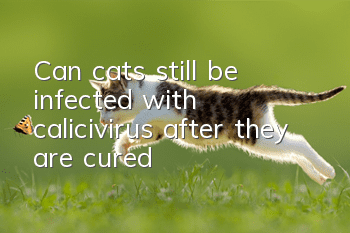Can cats still be infected with calicivirus after they are cured?

Symptoms of feline calicivirus:
1. Increased eye and nose secretions;
2. Bad breath and oral ulcers may occur later;
3. There will be obvious upper respiratory tract symptoms, such as sneezing, coughing, etc.; 4. Appetite will decrease and you may refuse to eat in the later stage.
Measures to treat calicivirus mainly include antibacterial, anti-inflammatory, antiviral, symptomatic treatment, and improving the body’s immunity. You can choose to use eye drops and eye ointments, use anti-inflammatory drugs and antiviral drugs at the same time, and add vitamin B2 to food.
Can cats still be infected with calicivirus after they are cured?
Recovered cats carry the virus for life and excrete the virus through their mouths, so there is a possibility of infecting other normal cats. However, cats that have recovered from infection will have relevant antibodies in their bodies, and these antibodies can neutralize feline calicivirus, making them less likely to be infected again. The clinical manifestations of feline calicivirus infection include oral and respiratory diseases, including oral ulcers, rhinitis, joint pain, fever, etc.
The symptoms of young cats infected with calicivirus are usually severe. Symptoms such as fever, rhinitis, and conjunctivitis will generally appear within three days after being infected with the virus. At the same time, the symptoms of calicivirus infection are similar to those of herpes virus infection. It is recommended to combine multiple diagnoses to determine the type of virus the cat is infected with, so as to provide basis for treatment in the future.
- Who says Maine Coon cats are difficult to raise?
- Cat eye color change process
- How to relieve male cats from being in heat
- What to do if your cat gets carsick
- Symptoms of retained placenta in female cats What are the risks of retained placenta
- Is catnip harmful to cats?
- Do you know the five things you should not do to your cat?
- You must pay attention to these 6 points when raising Persian cats, otherwise the cat will easily get sick.
- The appearance characteristics of silver tabby cats, are silver tabby cats easy to raise | How much does it cost
- What does a cat eat to produce milk the fastest and most?



